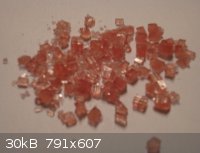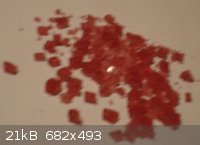| Pages:
1
2
3 |
watson.fawkes
International Hazard
    
Posts: 2793
Registered: 16-8-2008
Member Is Offline
Mood: No Mood
|
|
Quote: Originally posted by blogfast25  | | The problem is that with HCl you're severely limited in concentration (max. 37 w%). Concentrated HCl often doesn't even make a dent in oxides that
have been calcined. That's the primary reason for using H2SO4 95 % (or better). |
Have you ever tried a
Soxhelet apparatus for this? Freshly distilled HCl wouldn't change the ultimate solubility, but it might increase the reaction rate.
|
|
|
blogfast25
International Hazard
    
Posts: 10562
Registered: 3-2-2008
Location: Neverland
Member Is Offline
Mood: No Mood
|
|
Quote: Originally posted by watson.fawkes  | | Have you ever tried a Soxhelet apparatus for this? Freshly distilled HCl wouldn't change the ultimate solubility, but it might increase the reaction
rate. |
I can see where you're coming from this: a solvent free of NdCl3 would marginally improve rate of dissolution. I doubt if the effect is worth
deploying the Soxhlet extractor for it though...
|
|
|
watson.fawkes
International Hazard
    
Posts: 2793
Registered: 16-8-2008
Member Is Offline
Mood: No Mood
|
|
It might not be. Another
thing that might be tried with one, however, would be to introduce gaseous HCl into an adapter at the lower end of the condenser. This would allow
working with HCl of higher concentration. If the condenser is operating at sufficiently low temperature, it should keep fuming down to a minimum.
|
|
|
blogfast25
International Hazard
    
Posts: 10562
Registered: 3-2-2008
Location: Neverland
Member Is Offline
Mood: No Mood
|
|
Hmmm... I think I'll stick to:
* treat oxide with hot, conc. H2SO4
* treat cooled sulphate with strong NH3, filter and wash filter cake
* dissolve Nd hydroxide in HCl, filter off any non-dissolved matter.
|
|
|
woelen
Super Administrator
        
Posts: 8037
Registered: 20-8-2005
Location: Netherlands
Member Is Offline
Mood: interested
|
|
This is another interesting observation. It really is strange that you need hot conc. H2SO4 to get your non-calcined oxide dissolved, while mine
dissolves with just gentle heating in dilute 10% HCl or 2 M H2SO4. I even note formation of some heat when the Nd2O3 dissolves.
|
|
|
blogfast25
International Hazard
    
Posts: 10562
Registered: 3-2-2008
Location: Neverland
Member Is Offline
Mood: No Mood
|
|
Yes, it's strange. I only dried it in a glass beaker on a hot plate, full heat, while stirring. It was completely insoluble in HCl.
What do you think of the water loss in CaCl2 desiccator? I need to repeat that one.
|
|
|
Poppy
Hazard to Others
  
Posts: 294
Registered: 3-11-2011
Member Is Offline
Mood: † chemical zombie
|
|
Your results are incompatibly outrageous, my crystal samples, made by evaporation, showed color differences normally not seen with liquid or powdered
samples.
Here follows the link of a similar event, for those not familiar with.
http://www.sciencemadness.org/talk/viewthread.php?tid=25501
Pic are going to come when the camera is ready.
You have bigger of a problem than you can handle apparently.
|
|
|
Poppy
Hazard to Others
  
Posts: 294
Registered: 3-11-2011
Member Is Offline
Mood: † chemical zombie
|
|
EDITED:
Sorry mister, for our delay, here comes therefore the mentioned images. The difference is unoticeable, and it comes to being the crystals are very
hard, and perhaps what else one would have expected for having crystalizinng skills like that?
Grating you on showing, good moods to follow!
C ya Poppy
 
[Edited on 9-3-2013 by Poppy]
|
|
|
Bezaleel
Hazard to Others
  
Posts: 444
Registered: 28-2-2009
Member Is Offline
Mood: transitional
|
|
Poppy, in the poicture on the left I notice that you have various crystals that are _very_ light red, whereas you also have cystals in there that are
normal red, i.e. normal with respect to what you would expect from Nd.
What's the size of these crystals? Are you sure you don't have any lanthanum mixed in your Nd?
|
|
|
blogfast25
International Hazard
    
Posts: 10562
Registered: 3-2-2008
Location: Neverland
Member Is Offline
Mood: No Mood
|
|
That difference is not significant, IMHO. One photo is out of focus and the materials seem to be lit differently. Even the background is a slightly
different hue in both photos.
To compare the colour of these materials much tighter control of the photographing conditions is needed, otherwise one is comparing apples and pears.
To conclude that this 'difference' may be due to an impurity at this point is simply not possible.
Huh?
[Edited on 2-9-2013 by blogfast25]
|
|
|
Poppy
Hazard to Others
  
Posts: 294
Registered: 3-11-2011
Member Is Offline
Mood: † chemical zombie
|
|
Ops sorry, I used a translator which apparently showed some typing erros, and as I was not at home I had to go and forgot to check the spellings -
what the hell is that ?!
Referring to the images, one was picked useing TL bulbs and the other was taken on the shine of a flurescent tube. there is no great difference, and
sunlight doesn't do different on them. They are 5mm - 9mm wide, mostly, and all of them showed this cube like shape, with stritiations visible in all
sides. Cool, but I really think Woelen's original samples are fairly contaminated.
I used extra sulfuric acid in the motherliquor whereby the crystal where recrystalized, so now the crystal should be pretty pure.
Sorry, my camera can't handle zooming closer than that.
|
|
|
phlogiston
International Hazard
    
Posts: 1379
Registered: 26-4-2008
Location: Neon Thorium Erbium Lanthanum Neodymium Sulphur
Member Is Offline
Mood: pyrophoric
|
|
It would be best if you could take a picture of both of your samples of crystals in a single picture (and therefore under one set of lighting
conditions).
<i>PS.</i> please double-check you spelling, Poppy. Your English is good enough. Just get the spelling right, otherwise some words become
ambiguous.
-----
"If a rocket goes up, who cares where it comes down, that's not my concern said Wernher von Braun" - Tom Lehrer |
|
|
Poppy
Hazard to Others
  
Posts: 294
Registered: 3-11-2011
Member Is Offline
Mood: † chemical zombie
|
|
Quote: Originally posted by phlogiston  | It would be best if you could take a picture of both of your samples of crystals in a single picture (and therefore under one set of lighting
conditions).
|
The crystals are the very same exact sample!
Woelen's vials are showing an unacceptable color pattern and most pictures of the dimmie's sulphate posted here in the forums seems to appear as a
different sort of shape. Also, maybe they didn't grow large enough perhaps.
|
|
|
woelen
Super Administrator
        
Posts: 8037
Registered: 20-8-2005
Location: Netherlands
Member Is Offline
Mood: interested
|
|
If these crystals are 5 to 9 mm size, then I think that they only contain Nd-sulfate at low concentration (especially the crystals in the left
picture). They almost look like crystals of a colorless salt, in which some Nd-ions are mixed. I would expect crystals of such a large size to be MUCH
less transparent. My reddish crystals are as transparent, but they only have sizes of 0.5 to 1.0 mm.
|
|
|
Poppy
Hazard to Others
  
Posts: 294
Registered: 3-11-2011
Member Is Offline
Mood: † chemical zombie
|
|
This can't be! Check the thread on neodimium and you 'll see my yiled was already cut down by the sake of purification, and I steped through the oxide
first, so iron contamination could go above 5% in the first crop. Its the third time I'm crystallizing the thing, and only sulfuric was added as a
booster.
|
|
|
blogfast25
International Hazard
    
Posts: 10562
Registered: 3-2-2008
Location: Neverland
Member Is Offline
Mood: No Mood
|
|
Not 'cool'. Tests upthread show contamination (other REs) to be an UNLIKELY cause of the difference in colour (woelen's samples).
See here:
http://www.sciencemadness.org/talk/viewthread.php?tid=24851&...
[Edited on 4-9-2013 by blogfast25]
|
|
|
Poppy
Hazard to Others
  
Posts: 294
Registered: 3-11-2011
Member Is Offline
Mood: † chemical zombie
|
|
K I'll redissolve the crystals and precipitate them with Na2CO3 and NaOH mixture, because I think the evolution of CO2 may fasten the neutralisation
rather than with solely water as product, boil in this basic medium for 1h, then remake the crystals.
My Nd2O3 oxide may have contained some NdCl3 as bfsser has pointed out.
|
|
|
Wizzard
Hazard to Others
  
Posts: 337
Registered: 22-3-2010
Member Is Offline
Mood: No Mood
|
|
How about I fan the flames, here?
To the left, my Neodymium Sulfate from a "modern" batch - Neodymium magnets made this decade. They have a purple/rosy color. These are from my
previous large batch.
To the right, Neodymium Sulfate from a set of VERY old Neodymium magnets - From the early 90s. They are a beautiful amethyst purple. This is a partial
batch, I have some more coming out of the solution.
http://imgur.com/PMcePZM Lighting is LED (Cell phone flash)
The only difference, aside from the age of the magnet's date of manufacture, is the method used to grow the crystals - They were both isolated with
heat swing, but the amethyst purple crystals were grown at room temperature (20*C), the rosy crystals at elevated (50+*C) temperature.
I am going to try to regrow the remaining batch of the amethyst neodymium at elevated temperature, see how they come out.
[Edited on 9-7-2013 by Wizzard]
|
|
|
| Pages:
1
2
3 |